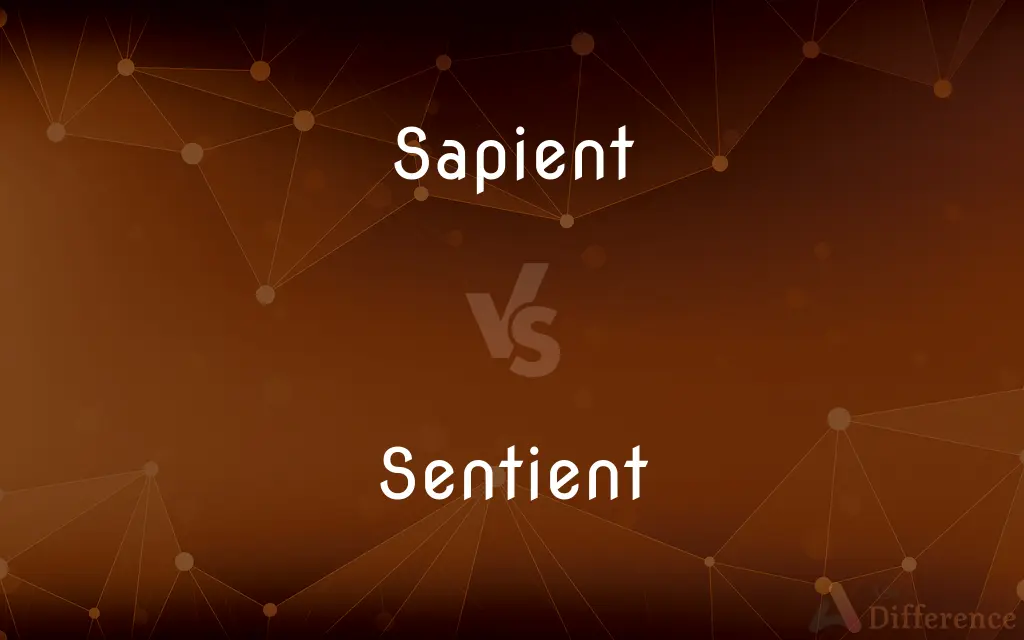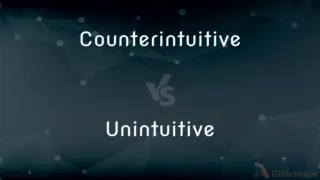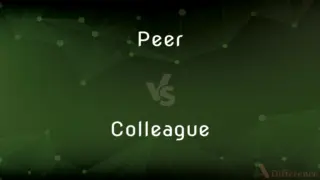Sapient vs. Sentient — What's the Difference?
By Tayyaba Rehman — Updated on October 9, 2023
Sapient refers to wisdom or intelligence; Sentient denotes the ability to perceive or feel things. Both describe cognitive qualities, but on different scales.

Difference Between Sapient and Sentient
Table of Contents
ADVERTISEMENT
Key Differences
Sapient and sentient are terms that define distinct cognitive capacities in beings. While both relate to mental faculties, they differentiate in depth and breadth. Sapient pertains to wisdom, discernment, or intelligence, a trait commonly attributed to humans. It goes beyond just perception, tapping into advanced reasoning and judgment. Sentient, however, zeroes in on the basic ability of a being to perceive, feel, or experience subjectively.
Drawing from their etymological roots, "sapient" stems from the Latin "sapere," meaning "to taste, to be wise." It embodies a depth of understanding and cognition. On the contrary, "sentient" comes from the Latin "sentire," which translates to "to feel." It simply portrays the capacity to have feelings and perceptions. Most animals, for instance, are sentient because they can feel pain and experience emotions.
One might argue that all sapient beings are sentient, but not all sentient beings are sapient. A dog, for example, is sentient as it can feel joy or pain. However, it might not be considered sapient in the way humans are, given our advanced cognitive functions and reasoning capabilities. Sentience forms the foundation, a more widespread trait across various life forms, while sapience represents a higher, more intricate form of cognitive processing.
In popular culture, especially in discussions surrounding extraterrestrial life or artificial intelligence, the distinction becomes even more vital. An AI might be sentient in that it can perceive its surroundings, but whether it can be sapient, possessing human-like wisdom and judgment, remains a subject of debate. Both terms, sapient and sentient, challenge our understanding of consciousness, intelligence, and what it truly means to "know."
Comparison Chart
Definition
Relating to wisdom or intelligence
Ability to perceive or feel things
ADVERTISEMENT
Etymology
From Latin "sapere" meaning "to be wise"
From Latin "sentire" meaning "to feel"
Inherent Qualities
Advanced reasoning, judgment, discernment
Basic feelings, perceptions, subjective experiences
Examples in Nature
Predominantly humans
Most animals like dogs, cats, etc.
Cultural Context
Used to discuss advanced cognitive abilities in AI or aliens
Broader term for beings with basic feeling capacities
Compare with Definitions
Sapient
Sapient indicates discernment.
His sapient remarks won him many debates.
Sentient
Sentient denotes subjective experiences.
Every sentient being deserves empathy and respect.
Sapient
Sapient encompasses intelligence.
The scholar's sapient insights were highly regarded.
Sentient
Sentient implies consciousness.
The sentient robot could interpret human emotions.
Sapient
Sapient refers to being wise.
The elders are often viewed as sapient guides.
Sentient
Sentient encompasses awareness.
The sentient alien species communicated using telepathy.
Sapient
Sapient entails sound judgment.
The sapient leader made decisions that benefited all.
Sentient
Sentient means having perception.
The animal, being sentient, could sense danger.
Sapient
Sapient describes advanced reasoning.
Humans are considered sapient beings due to their cognitive capabilities.
Sentient
Sentient refers to the ability to feel.
Plants, unlike animals, aren't sentient in the traditional sense.
Sapient
Having great wisdom and discernment.
Sentient
Having sense perception; conscious
"The living knew themselves just sentient puppets on God's stage" (T.E. Lawrence).
Sapient
Attempting to appear wise or discerning.
Sentient
Experiencing sensation or feeling.
Sapient
(dated) Possessing wisdom and discernment; wise, learned.
Sentient
Experiencing sensation, thought, or feeling.
Sapient
Of a species or life-form, possessing intelligence or self-awareness.
Sentient
Able to consciously perceive through the use of sense faculties.
Sapient
An intelligent, self-aware being.
Sentient
Possessing human-like awareness and intelligence.
Sapient
Wise; sage; discerning; - often in irony or contempt.
Where the sapient kingHeld dalliance with his fair Egyptian spouse.
Sentient
Lifeform with the capability to feel sensation, such as pain.
Sapient
Acutely insightful and wise;
Much too perspicacious to be taken in by such a spurious argument
Observant and thoughtful, he was given to asking sagacious questions
A source of valuable insights and sapient advice to educators
Sentient
An intelligent, self-aware being.
Sentient
Having a faculty, or faculties, of sensation and perception.
Sentient
One who has the faculty of perception; a sentient being.
Sentient
Endowed with feeling and unstructured consciousness;
The living knew themselves just sentient puppets on God's stage
Sentient
Consciously perceiving;
Sentient of the intolerable load
A boy so sentient of his surroundings
Common Curiosities
Can an animal be sapient?
While animals are sentient (can feel), sapience (advanced reasoning) is typically attributed to humans.
Are humans both sapient and sentient?
Yes, humans are both sapient (possessing wisdom) and sentient (able to perceive and feel).
Are there creatures that are neither sapient nor sentient?
Yes, simple organisms like bacteria are neither sapient (wise) nor sentient (capable of feeling or perception).
How does sapient differ from intelligent?
While both indicate cognitive abilities, "sapient" leans more towards wisdom and discernment, whereas "intelligent" is a broader term for the ability to think, learn, and understand.
Do the terms "sapient" and "homo sapiens" relate?
Yes, "Homo sapiens," the scientific name for humans, means "wise man," reflecting the sapient nature of human beings.
Is every sentient being also sapient?
No, all sapient beings are sentient, but not all sentient beings are necessarily sapient.
Why is the term sentient important in animal rights discussions?
It emphasizes the ability of animals to feel pain and emotions, which has ethical implications for their treatment.
Would a computer understanding language be considered sapient?
Understanding language indicates a level of processing, but sapience involves deeper reasoning and discernment, so a mere understanding of language doesn't necessarily imply sapience.
Why are these terms relevant in science fiction?
They address questions of consciousness, intelligence, and ethical treatment of non-human entities, like aliens or robots.
Which is a more fundamental trait, sapience or sentience?
Sentience is more fundamental, indicating basic perception and feeling, while sapience represents higher cognitive functions.
Are plants sentient?
Traditionally, plants are not considered sentient as they don't have feelings or subjective experiences in the way animals do.
Can machines be sapient or sentient?
Currently, machines might exhibit traits of sentience (basic perception), but sapience (human-like wisdom) in machines is a debated concept in AI.
How are these terms used in ethics and philosophy?
They're central to discussions about consciousness, the moral rights of beings, and the nature of intelligence and awareness.
Can a being lose its sentient or sapient status?
While sapience can diminish due to conditions like dementia, sentience (basic feeling) typically remains unless a being is deceased or in a vegetative state.
Are there levels to sentience?
While sentience indicates the capacity to feel, the depth and range of these feelings might vary across different beings.
Share Your Discovery

Previous Comparison
Counterintuitive vs. Unintuitive
Next Comparison
Peer vs. ColleagueAuthor Spotlight
Written by
Tayyaba RehmanTayyaba Rehman is a distinguished writer, currently serving as a primary contributor to askdifference.com. As a researcher in semantics and etymology, Tayyaba's passion for the complexity of languages and their distinctions has found a perfect home on the platform. Tayyaba delves into the intricacies of language, distinguishing between commonly confused words and phrases, thereby providing clarity for readers worldwide.
















































